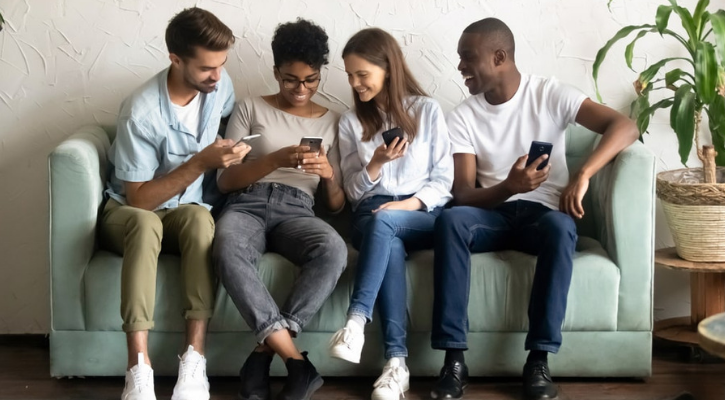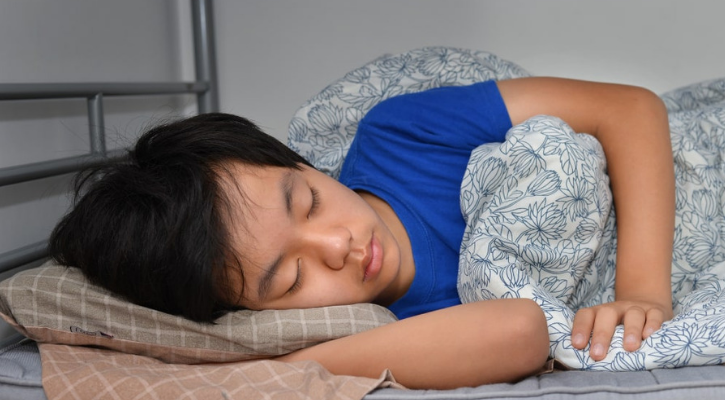Teens who cut back on screen time for as little as one week may enjoy more sleep and feel less fatigued, according to a new study.
Frequent screen users who reduced their screen time and/or utilized blue-light-blocking glasses during the study went to bed earlier and experienced more natural circadian rhythms compared to when they were heavily using screens. These changes were observed during intervention periods of a single week.
Dr. Nikola Djordjevic, founder of MedAlertHelp and a member of the Mattress Clarity Expert Network, told Mattress Clarity via email that one of the primary causes of poor-quality sleep in teens is exposure to blue light. “The more they are exposed to it, the more their sleep hormones are affected,” he says. Mattress Clarity also reached out to the study’s authors but has yet to hear back.
This study, which was published in Endocrine Abstracts, provides insights into simple yet effective strategies for reducing teens’ exposure to blue light and improving their sleep in the process. The study’s findings will be presented at the European Society of Endocrinology annual meeting.
Teens, Screens, And Sleep
Researchers have known for a while that exposure to blue light, which is emitted by electronic devices including smartphones and tablets, can suppress the body’s production of the sleep-promoting hormone melatonin, thereby interfering with a person’s ability to fall and stay asleep. (This is of particular concern when blue light exposure occurs in the evening hours.)
These findings are significant for screen users of all ages, but they’re particularly relevant to teens because of the sheer amount of time this age groups spends in front of screens. Pew Research has found that 95% of teens ages 13 to 17 have access to a smartphone, and 45% of teens report being online ‘almost constantly.’
RELATED: Best Mattress For Teenagers
“Teens may be especially impacted by ‘blue light’ emitting screen sleep disturbance, since this generation grew up with portable electronics as a significant way to communicate with other individuals and obtain entertainment,” Dr. Kasey Nichols, Doctor of Naturopathic Medicine and Sleep Expert for RaveReviews.org, told Mattress Clarity via email. “Technology, including screen time, continues to have an increasing impact and role in the daily lives of individuals.”
All this screen time can impact teens’ sleep in several ways, says Julie Lambert, a Certified Sleep Expert at HappySleepyHead.
“It’s not just about scrolling social media instead of sleeping,” Lambert says. “Screens emit blue light, which slows down melatonin production and promotes excessive alertness. Plus, notifications from Snapchat and other messengers may wake you up when you’ve just started falling asleep and may continue disrupting your sleep throughout the night. No wonder we have such statistics — a 2017 survey by the University of San Diego reported that 40% of teenagers get less than 7 hours of sleep per night, which is 17% [higher] compared to 2009.”
Nichols concurs. “I find that many teens are glued to their cell phones or other electronics from the time they wake up in the morning to the time they go to bed at night, leading to vast amounts of data processing by the brain,” he says. “I commonly see in the patients I treat, sleep is disturbed by racing thoughts at night about the information sent through mobile devices or misunderstandings that occur through electronic conversations.”
Djordjevic says that constant screen exposure can also interfere with teens’ natural circadian rhythms, thereby increasing the odds that they’ll experience sleep disruptions.
The new study suggests these changes are not permanent and can be reversed simply by reducing screen time.
The Study: Teens And Blue Light
The study examined 55 Dutch adolescents between the ages of 12 and 17. Some of these participants were frequent screen users (defined as teens who spent more than four hours per day in front of screens), while others were identified as infrequent users (who spent less than one hour per day in front of screens).
The researchers examined these participants over the course of five weeks and under different circumstances, including habitual screen use, screen use while wearing blue-light-blocking glasses, and refraining completely from screen use. (The study weeks were spaced one week apart from each other, with “washout” weeks in between.) The study authors used actigraphy, sleep diaries, and melatonin onset to track the quality of participants’ sleep.
At the onset of the study, frequent screen users generally went to bed later and experienced more sleep disruptions than infrequent screen users. The study tested two interventions among the frequent screen users: namely, abstaining from screen use or using blue-light-blocking glasses. The infrequent screen users served as a control group.
The study found that both using blue-light-blocking glasses and refraining from screen use resulted in falling asleep earlier and experiencing fewer sleep disruptions compared to the week when frequent screen users engaged in their habitual levels of screen use.
Participants who reduced their exposure to blue light in the evening also reported less fatigue, better concentration, and better mood.
Reducing Blue Light Exposure Among Teens
According to Djordjevic, it makes sense that teens who reduced their blue light exposure experienced better sleep. “Limiting blue light can help restore the brain’s chemistry and regulate hormone levels,” he says.
Reducing screen time might also have a calming effect that can help promote sleep.
“Teens’ bodies won’t be exposed to so many stimuli, which will allow their brains and bodies to relax,” Djordjevic says. “As little as one week is enough to see major improvements. Teens’ bodies respond quickly to any change in the environment, which is why it takes them less time to recover and go back to normal rhythms.”
Increasing the amount of time that teens sleep is important because people at this developmental stage requires more sleep than adults. Current guidelines suggest that teens ages 13 to 18 should get eight to 10 hours of sleep each night.
Djordjevic says that when it comes to reducing teens’ blue light exposure, “cutting down time spent with electronics is definitely the best option.” If that’s not possible, then blue-light-blocking glasses or apps may increase the odds that teens will enjoy sound sleep.
Nichols recommends the following strategies for reducing teens’ screen exposure:
“Some strategies for limiting teen’s screen time may include:
- Storing cells in places other than bedrooms at night
- As a parent or guardian, model healthy electronic use behavior
- Set clear and reasonable electronic device usage [rules] for your teens
- Encourage your teens to perform physical recreation activities
- Encourage person-[to]-person communication during meals and other family times”
That said, Lambert cautions against overly restrictive parenting.
“Restricting and taking away gadgets will [not effectively limit screen time],” she says. “Because, you know, it’s a teenager. To tame their rebel spirit a bit, try to create a system of encouragements that will motivate your [child] to use less screen time. Also, it makes sense to suggest an alternative way of spending time, such as various family activities. This may contribute to building healthy relationships, too.”
Featured image: De Visu/Shutterstock
Editor’s Note: This piece was originally published on May 24, 2019. It was updated on May 29, 2019 to reflect insights from Dr. Nichols.
[Editor’s Note: The content provided on this site is for general informational purposes only. Any information provided is not a substitute for professional medical advice. We encourage individuals to consult with the appropriate health expert if they have concerns.]



